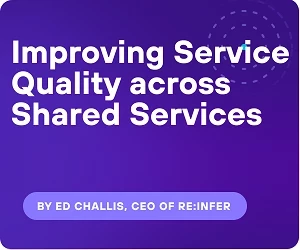
The pace of change is only accelerating across shared and global business services (GBS). If the consequence of the global pandemic has been disruption and digital adoption, its aftermath will see staggering acceleration as shared services leaders race to achieve hyperautomation. There are operational and technological challenges ahead, but incredible opportunities as well for those who take the lead and digitise ahead of the competition.
I had the great pleasure of attending the 22nd Annual European Shared Services and Outsourcing Week recently. While I enjoyed catching up with some old friends, what struck me most was the growing hunger for practical, technical solutions that are based in intelligent automation. The industry has been fundamentally changed by the events of the last few years, and leaders are more eager than ever to experiment with AI and to innovate for greater efficiency and superior service.
Here are my top takeaways:
We’re Seeing Evolving Digital Maturity Across Shared Services
There has been a tectonic shift from service provision to value-add. Meeting targets is simply no longer enough. There’s now a growing expectation from the business that shared services teams should deliver added value to the organisation. Increasingly, shared services is expected to drive greater efficiency in the organisation, while also enhancing client experiences and relationships.
Fortunately, shared services leaders aren’t hiding from this responsibility. Instead, they’re evolving the digital maturity of their functions to achieve their objectives. In the last year, they’ve embraced intelligent automation, adopting a growing suite of AI tools including RPA, process mining, OCR/IDP and natural language processing (NLP). Capabilities like Communications Mining are transforming their operational intelligence. Email to case and auto-triage are supercharging efficiency and freeing agents to focus on the work that matters.
As a result, leading organisations have been able to transform themselves despite the disruption of the pandemic and its aftermath. Through intelligent automation, they have been empowered to enhance customer experiences, scale their services, and achieve operational excellence. Their services have emerged from the disruption stronger, they are delivering better experiences, faster and more efficiently.
See first-hand how leading specialist insurer Hiscox is enhancing its broker services with NLP.
Language and Talent Play an Increasingly Important Role in GBS Success
Shared services is experiencing a rapid expansion in scale. While some teams have seen downsizing, many have seen their headcounts explode to cope with ever-rising demand. Certain organisations are converging disparate shared services centres over multiple geographies into one, while others are extending their operations into new regions and markets for the first time.
Many of the conversations we had were with shared services leaders who had a real growth mindset. But they were struggling with the teething issues of global expansion. Language barriers were a persistent issue. Supporting clients in foreign geographies was a clear priority, but finding skilled agents who could speak the required languages wasn’t easy.
We gave our usual advice: You can’t scale your shared services operation with people alone. This is unsustainable given the cost of talent and expertise these days. Instead, you should augment your human agents with the latest AI and NLP capabilities. Fortunately, you can automate transactional requests and queries in multiple languages with today’s conversational intelligence solutions.
Enhancing the Employee Experience is a Top Priority, and it’s Only Possible with Technology
Shared and business services know only too well how important the client experience is to satisfaction, loyalty and success. However, there’s a growing recognition that the individual experience of service agents is equally (if not more) important.
The past few years have been difficult for everyone, but especially for shared services agents who have dealt with the isolation of repeated lockdowns alongside record levels of demand. Almost half (49%) of frontline workers say they don’t find purpose in their work, and it’s estimated that 63% leave their position within three years of starting.
The first step in reengineering shared services towards value-add is by switching its agents to value-adding tasks. Transactional, communications-based jobs (like triaging an email to the right team or responding to a simple client request) drain staff. The work is repetitive, monotonous, but worst of all it pulls your agents away from the important work and client relationships. It stops them from delivering new services and digital offerings.
Communications work has traditionally been difficult to automate due to the unstructured nature of the processes and the fact they are based in human natural language. Most automation tools lack the sophistication and natural language understanding capabilities needed to process such requests safely and reliably. Yet this has changed with the advent of advanced NLP and Communications Mining solutions. When integrated with automation capabilities, these solutions are able to understand and automate all transactional requests and queries.























